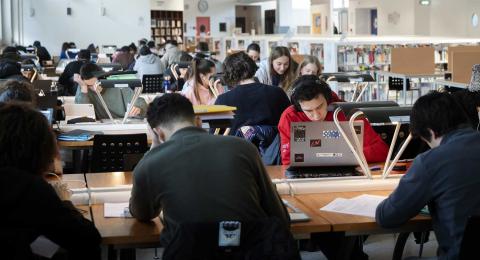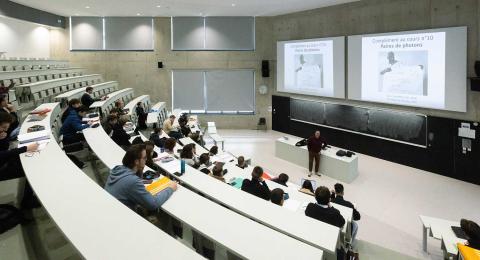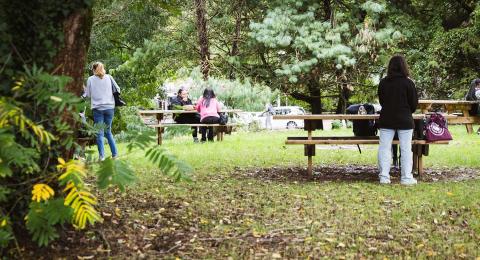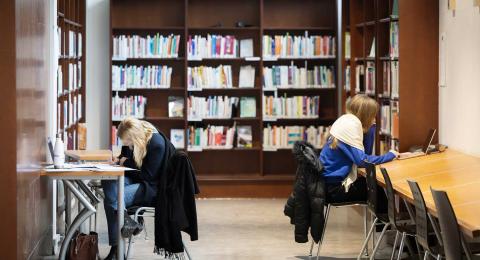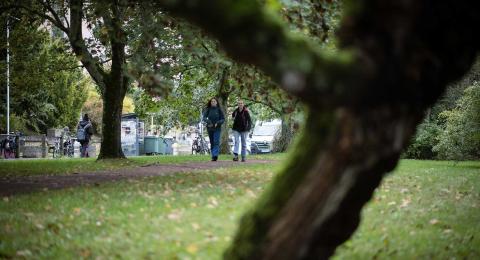The M2 Inorganic, Physical, and Solid State Chemistry (ChIPS) program is fully customizable, focused on fundamental research that addresses contemporary societal, environmental, and energy challenges.
Course supported by the internationally renowned research potential embodied by the laboratories of University Paris-Saclay and the instrumental facilities located nearby.
Emphasis is given on the personalization of the Master's program (M1 + M2), since students do choose not only their research topics and teams (internship), but also all 3rd semester teaching units (1st semester M2) from a panel of around fifteen or so subjects in inorganic chemistry, physical chemistry, theoretical chemistry theoretical chemistry and solid state chemistry. The course also aims at developping students' ability to conduct research projects, gain experience in teamwork and pass on their knowledge and know-how.
The notions of innovation and creation will also be combined with those of law and intellectual property as part of a cross-disciplinary skills unit.
Information
Objectives
The aim of this program is to provide the knowledge required for an in-depth understanding of complex molecular systems, whether synthetic or of biological origin, molecular-based materials and nano-objects, in order to meet current challenges in the fields of health, energy, environment and information. In this Master 2 program, the following issues will be addressed:
(i) synthesis concepts, physical and chemical properties, and spectroscopic and imaging characterizations of inorganic systems at different scales,
(ii) understanding and modeling molecular properties (structure, spectroscopies, kinetics, dynamics, thermodynamics, reactivity), with particular emphasis on exploiting the synergy between theory & simulations and experiments,
(iii) manipulation of chemical and physico-chemical phenomena on small time and/or space scales.
Career Opportunities
Career prospects
ingénieur chimie-environnement
Ingénieur de recherche ou d'études
Ingenieur R&D
Professeur agrégé en classes préparatoires, à l'université ou dans un institut scientifique
Professeur agrégé en lycée et collège
Further Study Opportunities
Chercheur/chercheuse en R&D ou expert·e en modélisation et analyse de données dans des entreprises ou laboratoires de pointe.
Doctorat
Doctorat en Chimie / Biologie
Fees and scholarships
The amounts may vary depending on the programme and your personal circumstances.
Admission Route
Capacity
Available Places
Target Audience and Entry Requirements
Master 1 or equivalent program in Chemistry, Physical Chemistry...
Application Period(s)
From 01/04/2026 to 14/07/2026
Supporting documents
Compulsory supporting documents
Motivation letter.
All transcripts of the years / semesters validated since the high school diploma at the date of application.
Curriculum Vitae.
Additional supporting documents
Certificate of French (compulsory for non-French speakers).
VAP file (obligatory for all persons requesting a valuation of the assets to enter the diploma).
Supporting documents :
- Residence permit stating the country of residence of the first country
- Or receipt of request stating the country of first asylum
- Or document from the UNHCR granting refugee status
- Or receipt of refugee status request delivered in France
- Or residence permit stating the refugee status delivered in France
- Or document stating subsidiary protection in France or abroad
- Or document stating temporary protection in France or abroad.





